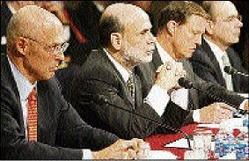
From left, Treasury Secretary Henry Paulson, Federal Reserve Chairman Ben Bernanke, Security and Exchange Commission (SEC) Chairman Christopher Cox, and Federal Housing Finance Agency Director James Lockhart testify on Capitol Hill in Washington, Tuesday, Sept. 23, 2008, before the Senate Banking Committee. - AP
NEW YORK (AP):
Financial markets extended their declines Tuesday as investors worried that lawmakers were beginning to doubt the necessity of a broad government bailout for financial institutions as a way to revive ailing credit markets.
Top economic officials updating Congress about efforts to work out a US$700 billion financial rescue plan faced a greater degree of second-guessing from lawmakers than some investors had expected. The Dow Jones industrials, which had been higher for the first half of the session ended at the lows of the day, tacking a 161-point loss onto a steep drop from Monday.
Still, trading appeared more orderly than Monday, when investors rushed into hard assets like oil and gold. Meanwhile, demand remained high for 3-month Treasury bills, considered the safest short-term financial asset, while the dollar regained some ground after being hard hit Monday.
370-point decline
The Dow fell 161.52, or 1.47 per cent, to 10,854.17 after having risen more than 125 points in the early going and then falling by more than 180. With Monday's 370-point decline, the blue chips are down 534 points, or 4.69 per cent, for the week.
Broader stock indicators also fell Tuesday. The Standard & Poor's 500 index fell 18.87, or 1.56 per cent, to 1,188.22, and the Nasdaq composite index fell 25.67, or 1.18 per cent, to 2,153.34.
After days of intense gyrations in financial markets, investors are anxious over whether the plan to absorb bad mortgages and other risky assets will help steer the economy onto more solid footing.
Treasury Secretary Henry Paulson, Federal Reserve Chairman Ben Bernanke and Securities and Exchange Commission Chairman Christopher Cox testified before lawmakers, who are working alongside others in the Bush administration to complete the details of the bailout.
But traders grew nervous as the officials faced questions about whether the government's planned response was appropriate. Sen. Chuck Schumer, for example, asked whether US$150 billion might be adequate to get the programme started if investors were told more money could be added if necessary.
The market remains uncertain about how long it will take for the bail-out plans to take effect, and assuming they do, how effective they will be.
"There's scepticism about whether the US$700 billion number is the right number," said Jim Herrick, manager and director of equity trading at Baird & Co.
Recession
Bernanke told the Senate Banking Committee that Congress risks triggering a recession if it doesn't act on the plan. He said inaction could leave a range of businesses unable to borrow the money, while consumers could find it impossible to finance big purchases like cars and homes.
Financial markets showed uneasiness as investors listened to the testimony, but not the fear and volatility that dominated Monday's trading.
The market for short-term Treasurys remained strained. The yield on the 3-month T-bill rose to fell to 0.79 per cent from 0.88 per cent on Monday; last week, it was around zero after investors flooded money into T-bills as the credit markets seized up. That spurred government officials to propose a debt buy-out plan.
The yield on the benchmark 10-year Treasury note, which trades opposite its price, fell to 3.82 per cent from 3.85 per cent late Monday.
The dollar, whose decline Monday drove some of the frenetic trading in other markets, regained some of its lost ground against the Euro, while gold prices declined after starting the week with a big advance.
"We had what felt like a bottom a few days ago, and I think we're going to retest the lows," Herrick said.
Investors also were watching oil prices after anxiety over the government bailout and a huge short-covering rally pushed crude to the biggest one-day gain.
Light, sweet crude for November delivery fell US$2.76 to settle at US$106.61 on the New York Mercantile Exchange. The October contract, which expired Monday, surged as much as US$25.45 to US$130 before falling back to settle at US$120.92, an advance of US$16.37. While that gain was due to technical market dynamics, the price of oil has moved higher over the past week amid increasing concerns about the US financial system.

